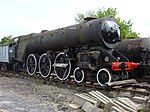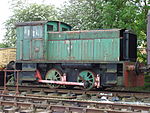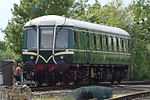Colne Valley Railway
This article needs additional citations for verification. (March 2015) |
| Colne Valley Railway | |
|---|---|
 Castle Hedingham station on the Colne Valley railway | |
| Commercial operations | |
| Built by | Colne Valley and Halstead Railway |
| Original gauge | 4 ft 8+1⁄2 in (1,435 mm) |
| Preserved operations | |
| Preserved gauge | 4 ft 8+1⁄2 in (1,435 mm) |
| Commercial history | |
| Opened | 1861/1863 |
| Closed | 1961 Passenger traffic 1965 Freight traffic |
| Preservation history | |
| 1973 | land purchase |
| 1974 | Preservation Society formed |
| Headquarters | Castle Hedingham Station |
Colne Valley and Halstead Railway | |||||||||||||||||||||||||||||||||||||||||||||||||||||||||||||||||||||||||||||||||||||||||||||||||||||||||||||||||||||||||
|---|---|---|---|---|---|---|---|---|---|---|---|---|---|---|---|---|---|---|---|---|---|---|---|---|---|---|---|---|---|---|---|---|---|---|---|---|---|---|---|---|---|---|---|---|---|---|---|---|---|---|---|---|---|---|---|---|---|---|---|---|---|---|---|---|---|---|---|---|---|---|---|---|---|---|---|---|---|---|---|---|---|---|---|---|---|---|---|---|---|---|---|---|---|---|---|---|---|---|---|---|---|---|---|---|---|---|---|---|---|---|---|---|---|---|---|---|---|---|---|---|---|
| |||||||||||||||||||||||||||||||||||||||||||||||||||||||||||||||||||||||||||||||||||||||||||||||||||||||||||||||||||||||||
The Colne Valley Railway is a heritage railway based at Castle Hedingham Station, near Halstead in Essex, England. The railway consists of a 1 mile (1.6 km) long running line, with a fully reconstructed station, signal box and railway yard.
History
The railway occupies part of the former Colne Valley and Halstead Railway (CVHR), which opened in stages between 16 April 1860 and 10 May 1863.[1] This part of the railway was a through line from Birdbrook to Wakes Colne.
The line closed on 1 January 1962, when all passenger and freight traffic between Haverhill and Yeldham ended. On 19 April 1965, all transiting freight traffic ended.[1] The line was de-constructed and infrastructure demolished or recovered by contractors a year later, and the land on which the heritage railway station's now sits resold under the lines original construction terms to the formally owning Hedingham Castle estate (HCE).
Preservation
A long-term lease on the required land was acquired from HCE in 1973, and the Colne Valley Railway Preservation Society (CVRPS) formed in 1974. Although originally a main line railway, the track and infrastructure was taken up in the late 60s, so on acquisition there was no remaining infrastructure onsite. The original Sible and Castle Hedingham station 1 mile (1.6 km) away and was taken down carefully brick by brick, the bricks numbered, and the structure transported to the new site and subsequently reconstructed. The timber top half (first floor) of the signal box came from Cressing, remounted on a new higher (ground floor) brick base. The bridge crossing the River Colne came from Earls Colne in 1982.[citation needed]
The first steam locomotive to arrive on site was Hunslet "Austerity" 0-6-0ST No.WD190 shortly followed by No.72. Members of the CVRPS began to operate the locomotives on a short section of line. Despite its still short length, presently the CVR is home to three ex-mainline steam locomotives, and holds Pullman dining services on a monthly basis.[citation needed]
Closure threat
HCE was acquired by Australian businessman Christopher Young. Instead of then renewing the CVRPS's long term lease, the terms were changed to a five-year renegotiable lease. In 2014, with the current 5-year lease due to expire on 31 December 2015, Young via HCE offered the CVRPS the option of buying the site's freehold. The CVRPS gained sufficient funds and loan backing to complete the terms in December 2014, but were told by HCE that Young's plans had changed.[citation needed]
The CVRPS were informed at their Annual General Meeting on 22 March 2015 that HCE had decided the railway no longer featured in future plans for HCE.[2] Planning permission would be sought for redevelopment of the site, which lies in a conservation area - a subsequent Freedom of Information request by local media discovered that outline planning permission had been sought for 600 houses on the station. The CVRPS were served notice that operations must cease after 31 December 2015, with the CVRPS having to remove all its rolling stock and buildings during 2016,[2] with possibility of relocation to another heritage railway.[3]
In June 2015, it was announced by CVRPS that a new site adjacent to the current one had been procured. Permission was being sought from HCE to operate as normal during 2016, with the railway operating from the new site from 2017.[2] A new station would be constructed at each end of the line, which would extend to 1 mile 4 chains (1.69 km).[4] Later that month, it was announced by the CVRPS that the proposed new site was "no longer viable" due to reasons that were not disclosed.[5] In July 2015 it was announced that the railway, on its original site, was now safe.[6]
Motive power
Steam locomotives
| Origin | Wheel arrangement |
Class | Notes | Photograph |
|---|---|---|---|---|
| LMS | 4-6-0 | Class 5MT | No. 45163 built 1935, Under restoration.[2] | |
| LMS | 4-6-0 | Class 5MT | No. 45293 built 1936, Under restoration.[2] | |
| SR | 4-6-2 | Merchant Navy Class | No. 35010 Blue Star, built 1942. Under external restoration.[2] | 
|
| Hunslet | 0-6-0ST | Austerity | No. WD190,[2] built in 1952. Operational. | |
| Hunslet | 0-6-0ST | Austerity | No. WD200,[2] built in 1953. Under restoration/overhaul. | |
| Avonside | 0-4-0ST | Barrington, built 1921. Under overhaul. | ||
| Hawthorne Leslie | 0-4-0ST | No. 1, built in 1928. External restoration.[2] | 
| |
| RSH | 0-6-0ST | 56 | No. 60 Jupiter,[2] built in 1950. Under restoration/ overhaul. |
Diesel locomotives
| Origin | Wheel arrangement |
Class | Notes | Photograph |
|---|---|---|---|---|
| BR | 0-6-0DM | Class 03 | No. D2041, operational. | 
|
| BR | 0-6-0DM | Class 03 | No. D2184, operational. | 
|
| BR | 0-6-0DM | Class 08 | No. 08 411, under restoration | 
|
| BR | A1A-A1A | Class 31 | No. 31 255, operational | 
|
| BR | Co-Co | Class 47 | No. 47 771 Heaton Traincare Depot, under restoration | 
|
| Ruston & Hornsby | 0-4-0DM | No. YD43, ex-Admiralty. operational | 
| |
| Andrew Barclay Sons & Co. | 4wDM | No. 349/41, operational | ||
| Lake and Elliot | 4wd | Fordson Major | No. 1 "Henry", operational | 
|
Diesel multiple units
| Origin | Class | Notes | Photograph |
|---|---|---|---|
| BR | Class 121 | No. 55033, built in 1960, operational | 
|
| BR | Class 121 | No. 56287, operational | |
| BR | Class 141 | No. 141 108, operational | 
|
| AC Cars / BR | Railbus | No. W79978, built in 1958, static display. | 
|
References
- ^ a b Gordon, D. I. (1990). A Regional History of the Railways of Great Britain. Vol. Volume 5, The Eastern Counties. Newton Abbot / North Pomfret: David St. John Thomas / David and Charles. pp. 162, 167. ISBN 0 946537 55 0.
{{cite book}}:|volume=has extra text (help) - ^ a b c d e f g h i j "Colne Valley shock: railway will close on December 31". Steam Railway (439). Peterborough: Bauer Consumer Media: 16–17. 27 March 2015. ISSN 0143-7232.
- ^ "Colne Valley cash Conundrum". Steam Railway (440). Peterborough: Bauer Consumer Media: 28–29. 24 April 2015. ISSN 0143-7232.
- ^ "Colne Valley moves to the other side of the river". Steam Railway (442). Peterborough: Bauer Consumer Media: 8–9. 18 June 2015. ISSN 0143-7232.
- ^ "Colne Valley Railway's preferred site no longer viable". Harwich and Manningtree Standard. Gannett. 25 June 2015. Retrieved 27 June 2015.
- ^ Colne Valley Railway is saved
